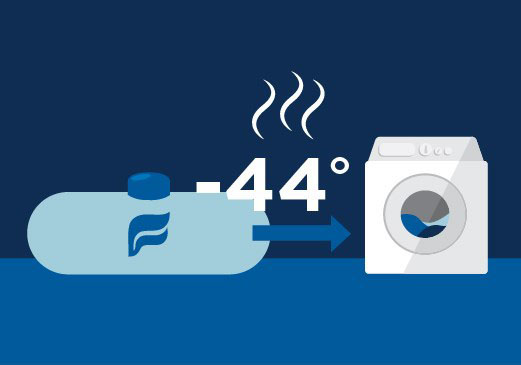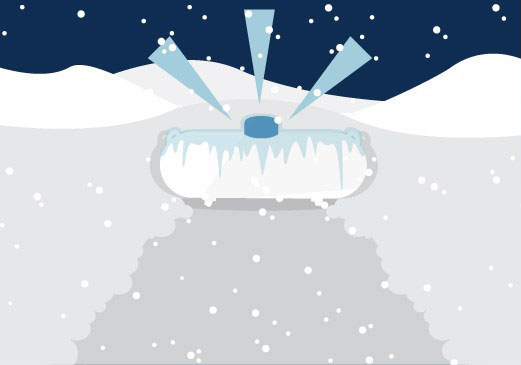Can propane freeze?
As we make our way through the coldest season of the year, many propane users find themselves wondering one thing – can propane freeze?
The answer is technically, yes. If the liquid form of propane gas falls to its impossibly cold freezing point of -306 degrees Fahrenheit - more than 200 degrees colder than the lowest recorded temperature in earth’s history. While laboratory studies have successfully frozen propane under induced conditions, the gas itself doesn’t freeze in a real world application.
But under extreme conditions, the components that store, move, and regulate propane from an outside tank to your home’s heater and appliances can be affected by frost and ice forming on cylinders, regulators and delivery lines. While this is an exceedingly rare occurrence during the most extreme conditions, it rarely interferes with system operation or performance.
Yet, there are steps you can take to ensure your propane system works without interruption even in the harshest of weather.
What causes propane to freeze?
Under pressure inside the tank, propane exists in a liquid state. As the liquid leaves the tank, it reaches -44 degrees, at which point the propane boils and returns to a gaseous state - ready for use in your appliances and heating systems. In extremely cold conditions, where temperatures persistently remain below zero, it’s possible for propane to retain its liquid form, rendering it unusable for equipment that relies on propane gas. These extreme temperatures also can lead to large pressure changes inside storage tanks as propane moves through the delivery system - potentially causing increased icing on storage tanks, regulators, and valves.

Most instances of “freezing” occur on pressure regulators - where the propane’s pressure is reduced to a level usable by appliances and equipment. As the liquid propane expands to a gas form and reaches its boiling point, it commonly freezes the available humidity around the regulator. This form of freezing isn’t cause for concern. However, in extremely rare cases, the propane can “freeze” and remain in a liquid state as it passes through the regulator. This is generally caused by a container that has been overfilled, which doesn’t leave enough space for the propane to “boil” and release vapor as the system demands fuel, or by a portable cylinder that isn’t positioned upright, which prevents fuel drawing from the vapor space inside the tank.
What steps can I take to keep my propane tank from freezing?
Preventative measures include making sure the area around your tank, as well as any related mechanical components, such as tank regulators, vents, and piping, are free from snow and ice to allow proper venting and operation. If you’re using a portable propane tank, be sure it’s correctly positioned. Additionally, it’s a good idea to keep your propane tank no less than one-quarter full during extremely cold temperatures, as empty tanks are more likely to ice up.

If you suspect your system isn’t working properly, contact your local Ferrellgas office. A trained professional will inspect your tank and delivery components to ensure they’re in good working order. Attempts to de-ice tanks or systems with flames or water are not recommended. For generations, propane has proven to be a clean, effective, safe, and trouble-free fuel for a variety of home and industrial applications - even in the most extreme weather conditions imaginable. To learn more about how to make sure your propane system is ready for the worst winter can deliver, visit the Propane 101 website.
CATEGORIES
Archives
- Summer 2025
- Spring 2025
- Winter 2024
- Fall 2024
- Summer 2024
- Spring 2024
- Winter 2023
- Fall 2023
- Summer 2023
- Spring 2023
- Winter 2022
- Fall 2022
- Summer 2022
- Spring 2022
- Winter 2021
- Fall 2021
- Summer 2021
- Spring 2021
- Winter 2020
- Fall 2020
- Summer 2020
- Spring 2020
- Winter 2019
- Fall 2019
- Summer 2019
- Spring 2019
- Winter 2018
- Fall 2018
- Summer 2018
- Spring 2018
- Winter 2017
